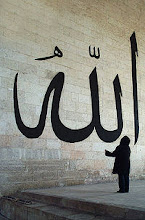 Bismillah, walhamdulillah wa-salaatu wa-salaamu 'ala Sayyidina Muhammad wa 'ala alihi wa-ashabihi wa-salaam tasleeman katheera
Bismillah, walhamdulillah wa-salaatu wa-salaamu 'ala Sayyidina Muhammad wa 'ala alihi wa-ashabihi wa-salaam tasleeman katheera All praise is for Allah. As such we praise Him and could never achieve justice in doing so to the extent at which He alone is worthy. May the peace and blessings of Allah eternally be upon His Messenger, his family, his companions and those who follow his guidance, purely as it was revealed, in truth and in righteousness until the Day of Judgement.
After Allah subhanahu wa ta'ala reminds us, in Surah ali-Imran ayah 146, of the number of nabbiyia (prophets) and rabbiyun (knowledgeable, righteous leaders of Islam) throughout time who've suffered massive loss and were tested with multiple afflictions on the battlefield while fighting for His Cause, yet never once losing hope or weakening in neither heart nor faith, pushing forward without surrender against the rebels of Allah; He, azza wa jall, makes it known: "And Allah loves al-Sabbireen (the patient)."
Allah subhanahu wa ta'ala also commands His Messenger, salallahu 'alayhi wa salaam, in the Qur'an:
"Say: O My servants who have believed, fear your Lord. For those who do good in this world there is good, and the earth of Allah is spacious. Indeed, the patient will be given their reward without account." -Surah az-Zumar ayah 10
And so it is clear, ar-Rahman, our Ever-Merciful Lord, loves and rewards limitlessly al-sabbireen. And what would bring us to understand the meaning of sabr? Our beloved Rasulullah salallahu 'alayhi wa salaam told us: "Sabr is a dhiya'." Often is this hadith interpreted to mean: "Patience is a light." However, the Arabic word for light is an-nur and the term that passed from our Messenger's blessed lips is ad-dhiya', salallahu 'alayhi wa salaam, whose linguistic meaning is "radiance" or "brightness" and there is a distinction. Ad-dhiya' is more powerful than an-nur, because while nur is but a shinning light, dhiya' is a source that not only shines, but generates heat. It explains why in the Qur'an, Allah, uses the term "dhiya'" to describe sunlight and reserves the term "nur" to describe moonlight.
From this we understand the stronger, more appropriate meaning of this hadith as:
"Patience is a brightness."
So why would our Prophet salallahu 'alayhi wa salaam describe sabr as a source emitting both light and heat as opposed to just light? It is because the process of attaining, developing then ultimately practicing patience is extremely difficult and at times painful. It requires effort and involves an inner-struggle (jihad an-nafs). So sabr can be attained, but not without experiencing some degree of strain and discomfort. As-sabr literally implies "to withhold" or to place something under one's control. Patience, self-mastery, self-discipline and self-control altogether project for us the real meaning of "sabr". To control one's nafs and withhold it from a state of panic, recklessness, fury and/or impatience. Also it entails withholding the tongue from complaining, vain argument, passing on or uttering negative things (i.e. insults, backbiting, gossip, etc.).
We observe in society and in our interactions with people that for the most minor and firvolous of reasons do people lose control and become impatient. Clearly, sabr is not implemented so simply. And it is based on this Rasulullah salallahu 'alayhi wa salaam said:
"Whoever pretends to be patient, desiring to be patient, Allah will make them patient."
So instead of stubbornly asserting "I can't be patient, that's just how I am." Or as my daughter (whom I love and am so grateful to Allah) would jokingly quote: "Patience is a virtue I've yet to master", expressing no interest in making even the slightest effort at being patient, our Prophet salallahu 'alayhi wa salaam said pretend to be patient. As if to say patience is a value that is not applied naturally, so force yourself to be patient, no matter how strenuous or painful, and your Lord will make you so.
The highest level of sabr is achieved when the call of Deen overcomes the call of passion. When obedience to Allah overcomes obedience to the nafs. Whether tried in a circumstance of hardship or ease, this is the most rewarding, most fulfilling manifestation of sabr. For the believer must apply sabr in both situations, difficulty and ease, with the latter being the most difficult. In fact, patience in times of ease is not only the most challenging, but it's the only one that none but the believer can perform. When we are met with something we desire that is allowed to us, something we love or excites us, we are to have sabr and gratitude (to Allah) thereby preventing it from distracting us from our purpose and goal (i.e. the worship and obedience to our Lord). Allah warned the believers:
"O you who believe, let not your families and your wealth deter you from the dhikr (remembrance) of Allah; and whosoever does that is indeed a loser." -Surah al-Munafiqun ayah 9
One testimony to the extent of difficulty in showing sabr in times of ease is a statement by the great Sahabi, Abdur-Rahman ibn Awf radiallahu 'anhu, who reminisced: "We were tried by hard times and we showed sabr, but when we were tried in ease and excess, we failed."
So the attainment of sabr necessitates consistent training; we must exert, strive and even force ourselves to show sabr in all situations. Classic scholar of Islam, Imam ibn Rajab al-Hanbali divided as-sabr in three categories:
- as-Sabru 'ala da'ati allahi: patience in performing acts of worship (ibadat) of Allah.
- as-Sabru 'an ma'asi allahi: patience in avoiding sins or disobedience of Allah.
- as-Sabru 'ala aqdari allahi: patience with the Qadr of Allah or the decree of Allah that is planned and pre-determined by Him and occurs to us in our lives.
What is especially important to note and keep in mind when discussing sabr is that Allah subhanahu wa ta'ala does not test any individual beyond their capacity. Allah ta'ala says what means:
"Allah does not burden any soul beyond its capacity." -Surah al-Baqarah ayah 286
And when Sa'ad ibn Abi Waqqas radallahu 'anhu asked our beloved Rasul salallahu 'alayhi wa salaam: "Ya Rasulullah, who amongst the people are tried the most?" He, salallahu 'alayhi wa salaam, replied and addressed through him all of us:
"an-Anbiyyah (the prophets of Allah), after them the Saliheen (righteous) and then in accordance to your level of deen (i.e. taqwa, iman, etc.)."
So on these testing grounds, known as dunya, every believer is tested according to their individual level in the deen. No one will be tested to the extent and extreme at which the Prophets 'alayhimus salaatu wa salaam were tested and no one will ever experience a point in this life in which they're not tested at all. And the best time to show sabr, when it is best recognized and compensated, is at the very instant calamity or a desired thing reaches us. As exemplified in the hadith where Muhammad salallahu 'alayhi wa salaam encountered a woman in cemetery grieving excessively over the burial of her loved one and advised her to show sabr, in her anguish she told the Prophet salallahu 'alayhi wa salaam: "Leave me alone! You were not afflicted with my affliction!" As Rasulullah salallahu 'alayhi wa salaam moved along to leave her alone, a few of the Sahabah informed her who it was she shouted at and she rushed to him to apologize and Rasulullah salallahu 'alayhi wa salaam told her:
"Sabr is to be shown at the beginning of a trial."
May Allah subhanahu wa ta'ala make us among al-Sabbireen, striving always to show sabr for His sake in all situations and conditions in hope for His Mercy and everlasting rewards. Allahumma ameen!

No comments:
Post a Comment